SHIPS OF SHAME
Middle East bulk animal carrier Al Messilah’s pre-arrival in East London sparks outcry over livestock export
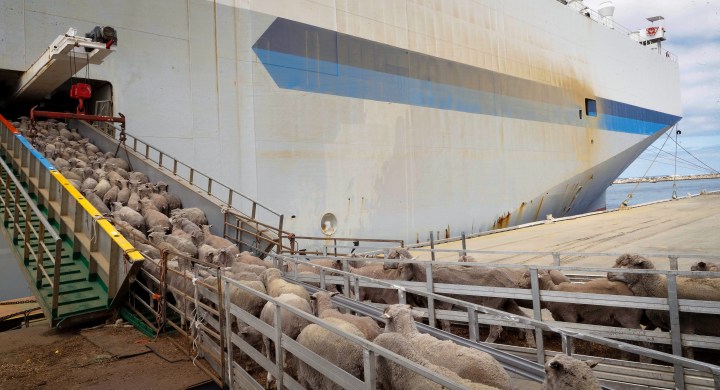
The bulk animal carrier Al Messilah – sister ship to the Al Kuwait, which stank out Cape Town in February with 19,000 cattle on board – is due to dock in East London on Tuesday.
One of the “ships of shame”, so called because of cruelty to their live animal cargo during long and gruelling voyages, the Al Messilah is to arrive in East London on Tuesday, 2 April 2024, after which it is scheduled to load about 60,000 sheep, 1,500 cattle and 200 goats destined for slaughter in Kuwait and Saudi Arabia.
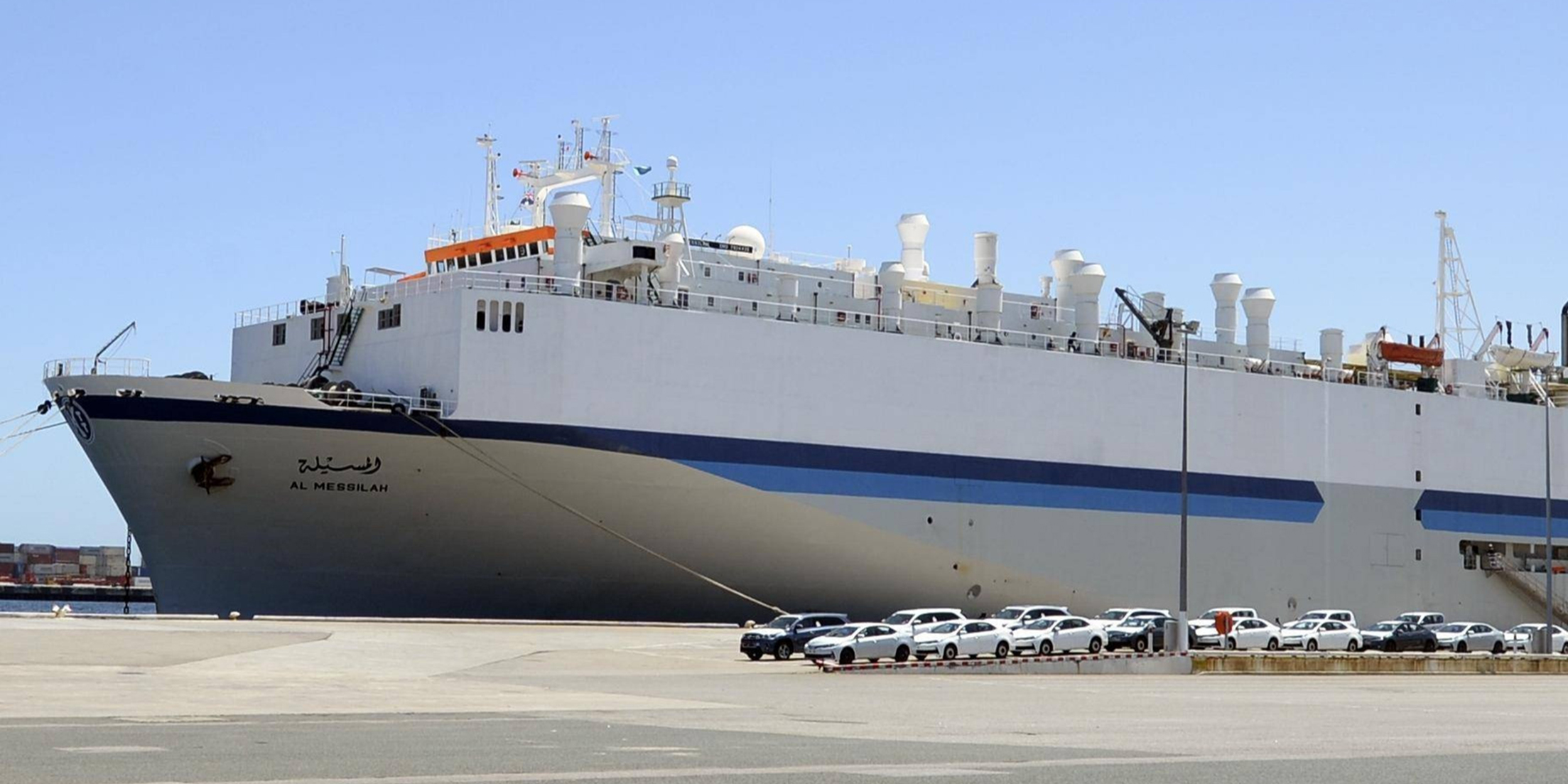
Al Messilah. (Photo: Al Mawashi)
In August 2023, a similar number of animals was loaded on to the vessel – a converted car carrier. At the time, the NSPCA brought charges against the local feedlot manager, who was arrested for cruelty for cutting off the horns of 126 rams with an angle grinder. Inspectors found the area awash with blood.
Read more in Daily Maverick: Eastern Cape feedlot manager arrested after mutilating 126 export rams with angle grinder
Last month, the NSPCA issued a warning to Bruce Page, the owner of the feedlot where the animals are awaiting transhipment, demanding that shade and water be provided and that injured animals receive appropriate treatment.
A week later, according to an NSPCA media statement, “inspectors encountered escalating hostility during the lawful inspection, conducted with a warrant. Mr Bruce Page displayed aggressive and discourteous behaviour and this culminated in a physical altercation towards one of our female inspectors, followed by his demands for the inspectors to leave the premises.”
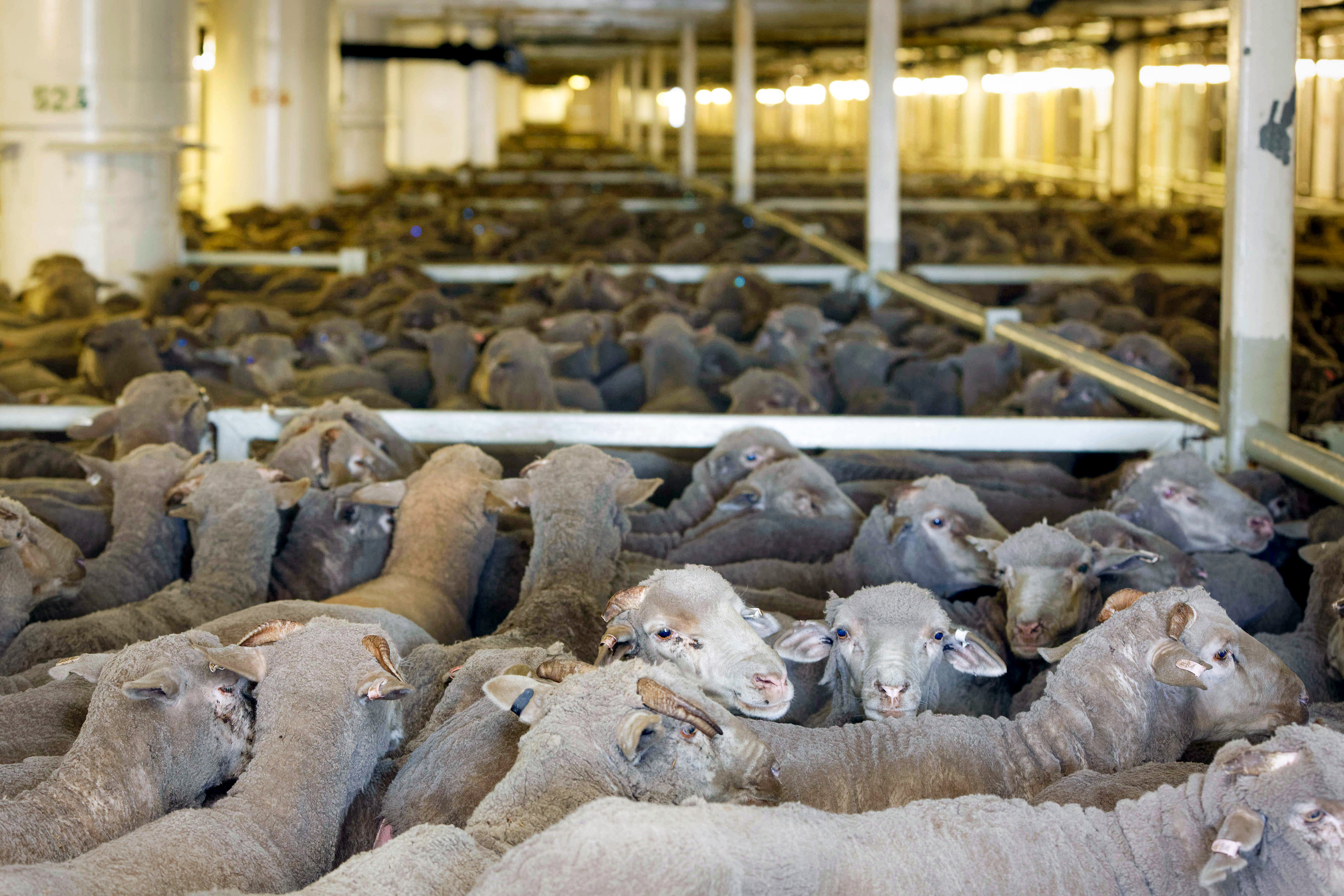
Sheep destined for the Middle East stand in pens onboard the Al Messilah livestock vessel at the Fremantle wharf near Perth, Australia, 22 February 2019. (Photo: EPA-EFE / Trevor Collens)
The NSPCA had to request assistance from members of the South African Police Service. The NSPCA currently have five prosecution cases against Al Mawashi and Mr Bruce Page of Page Farming Company.”
Al Mawashi owns the Al Messilah and Al Kuwait. Daily Maverick was not able to immediately reach Page or Al Mawashi for comment. Their comments will be added if received.
NSPCA on site
We spoke to the manager of the NSPCA’s farm animal unit, Nazareth Appelsamy, who was at the feedlot on Monday, 1 April 2024.
Don Pinnock: Could you give us a picture of what you’re seeing?
Nazareth Appelsamy: We’re quite shocked to see that – yet again – Al Mawashi has not prepared animals properly for another consignment. Maybe 10,000 animals have not been shorn. A requirement of government export guidelines is that no shearing may occur after 10 days before loading, which is scheduled for 3 April.
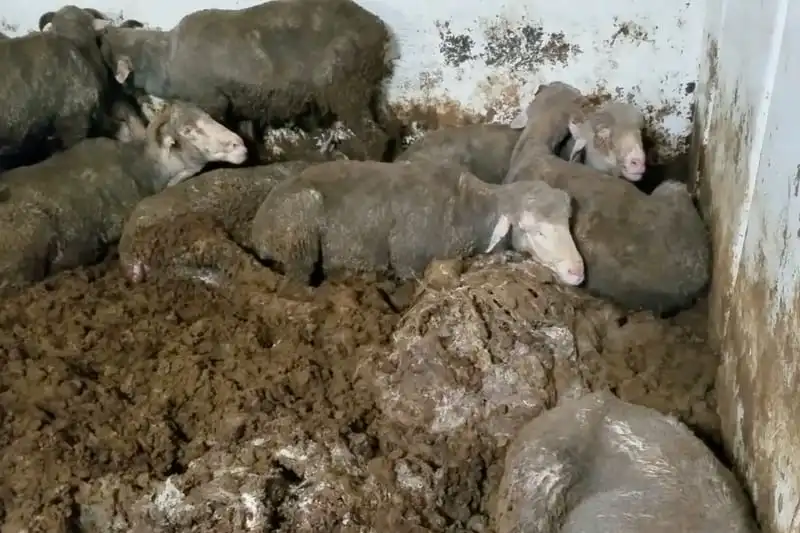
Shipped sheep can end up in horrific conditions. (Photo: Australia RSPCA)
As a result they’ve been rushing and slicing up the sheep. Really bad cuts. Some of them had to be stitched up – not by vets but by the workers. Extreme cruelty.
We’ve issued three warnings. One was they didn’t erect shelters as they were supposed to. There was no water in many of the pens. We found a lot of animals needing veterinarian care but have not [been] taken out and isolated. We found dead animals. And worst of all we suspect there are a lot of pregnant ewes on the farm.
DP: They can’t travel pregnant?
NA: No. We’ve already found two newborn lambs. We’ll be using a pregnancy scanning machine this week to make sure no pregnant animals go. All these animals are just not ready for the journey, and everything is being rushed.
The state vet has been screening. There are hundreds of animals that will not be fit for the journey. We’ll only know this week whether Al Mawashi is going to comply with regard to leaving injured and pregnant animals or comply with the guidelines. Any deviation will result in court proceedings. We have the power in terms of our Act to either seize or enforce the warrant we have.
It’s déjà vu all over again. It was the same last year.
DP: I’m sure you are not welcome on the farm.
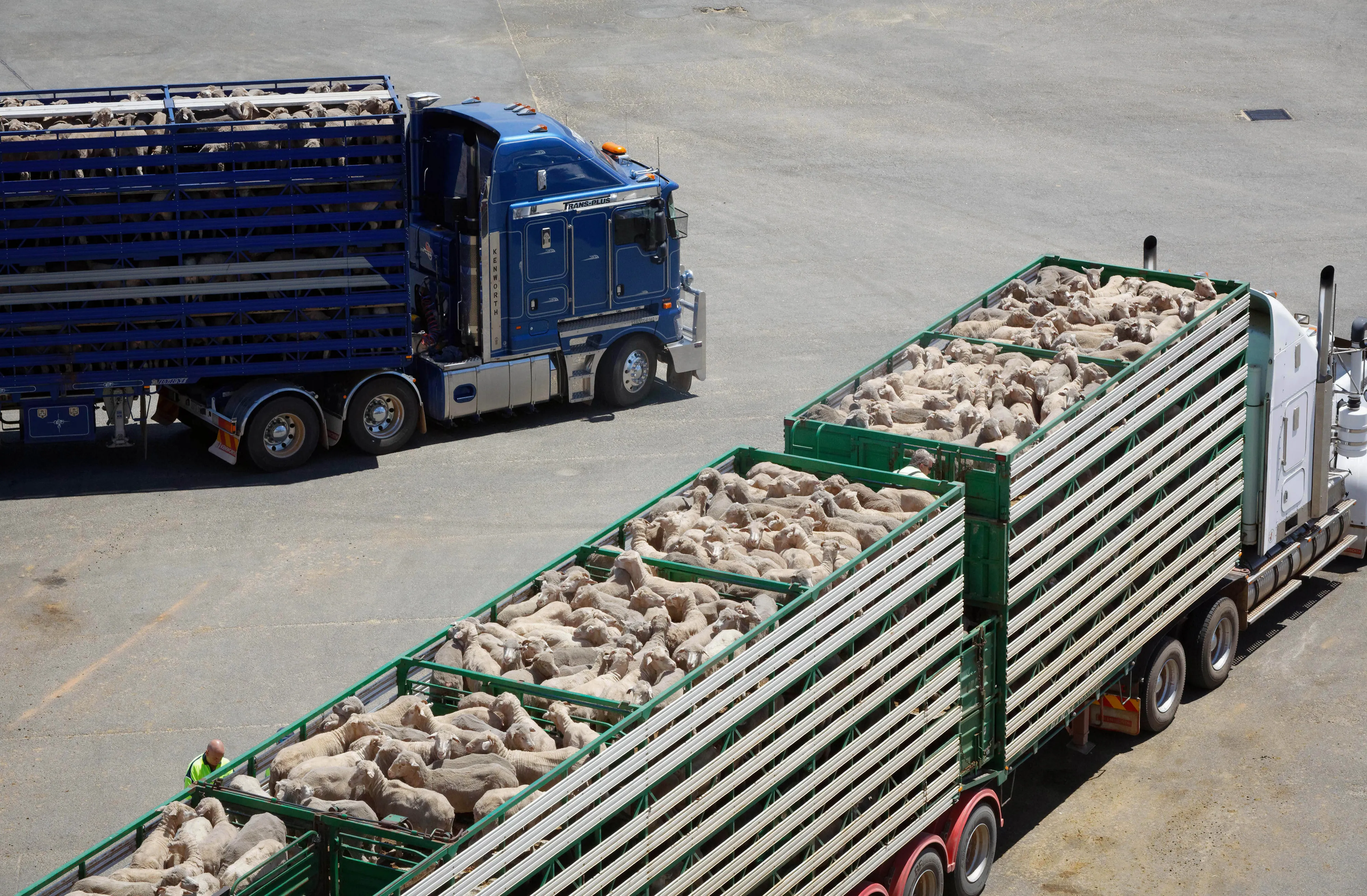
Sheep destined for the Middle on trucks before being loaded onboard the Al Messilah livestock vessel at the Fremantle wharf near Perth, Australia, 22 February 2019. (Photo: EPA-EFE / Trevor Collens)
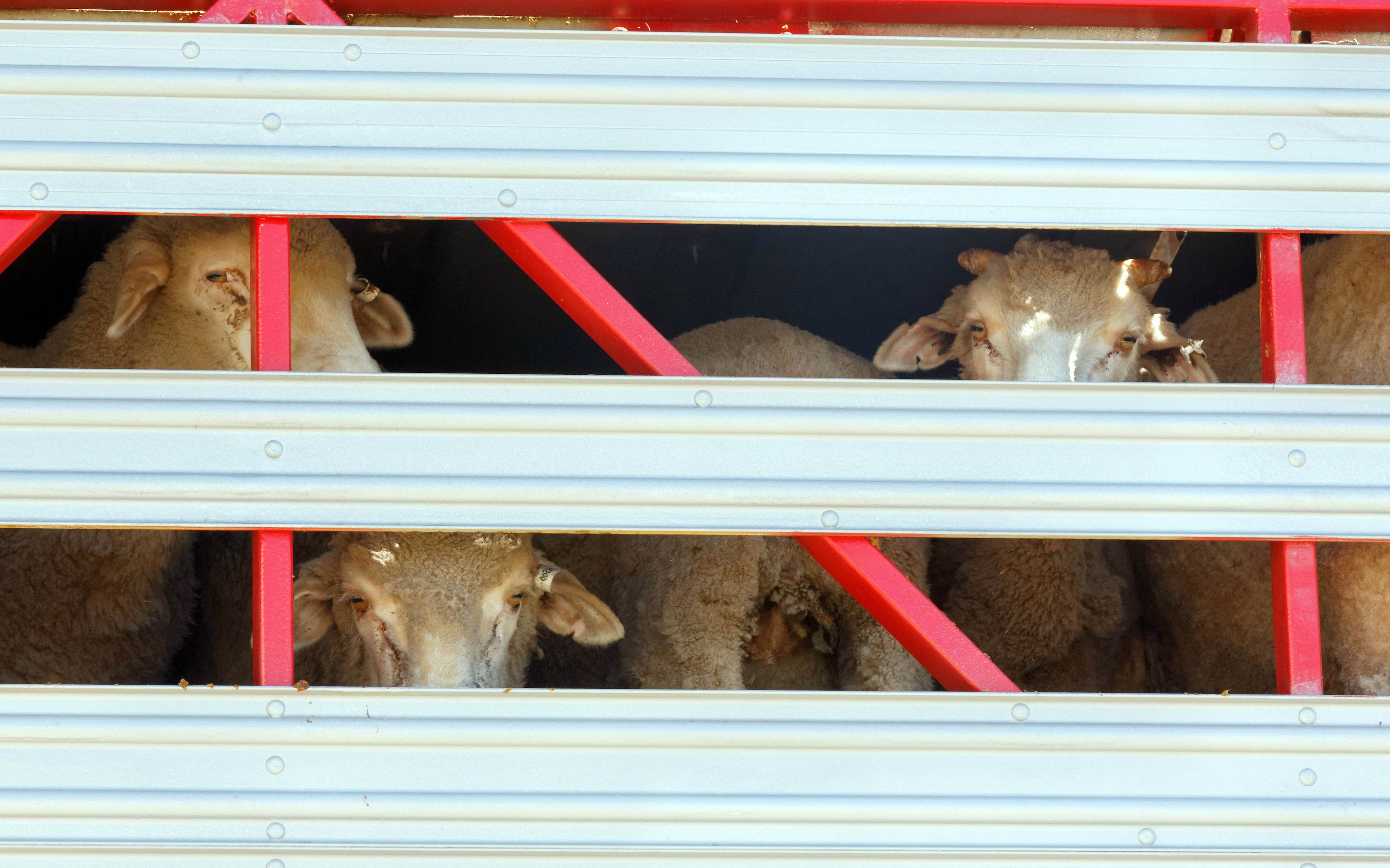
Sheep destined for the Middle East on a truck before being loaded onboard the Al Messilah livestock vessel at the Fremantle wharf near Perth, Australia, 22 February 2019. (Photo: EPA-EFE / Trevor Collens)
NA: Yeah, there’s been a lot of hostility between us and Al Mawashi. One of the managers grabbed and threw one of my female inspectors.
DP: Where are all those animals coming from?
NA: It’s a massive operation trucking them all in. They come in from all over the country. Think about it this way: rich Saudis are stripping the country of livestock, which is good for some farmers but depleting the local market. Prices for meat are going to rise and local people who depend on meat processing are going to lose their jobs.
Animal abuse
The NSPCA has encountered ongoing animal abuse at this feedlot. In June last year, inspectors thwarted attempts to load sick, pregnant, lame, heavily horned and unshorn sheep. They also confiscated the 131 rams with severed horns.
The monitoring of each shipment incurs considerable costs for the NSPCA, which it rightly points out should be the responsibility of the exporters. However, says the NSPCA, they appear “to prioritise profit over animal wellbeing”.
“The NSPCA remains adamantly opposed to the cruel and unnecessary transportation of live animals by sea,” the NSPCA press release said. “Until this practice ends, the NSPCA will leverage all available legal powers to ensure animal welfare is prioritised and continue with inspections to ensure that only healthy and suitable animals undergo such arduous journeys.”
Growing opposition
There has been ongoing opposition to the transport of live animals to the Middle East. In 2022, the NSPCA succeeded in stopping the proposed shipment of between 55,000 and 85,000 live sheep to the Kuwait, claiming 21 days at sea in baking heat constituted animal cruelty.
At the time, HSI/Africa executive director Tony Gerrans said the conditions experienced by animals during long-distance sea voyages contravened many provisions of South Africa’s Animal Protection Act.
“Transporting tens of thousands of sentient animals on a vessel means they endure 21 days of being packed together in pens without proper food and care, standing in their own excrement, breathing in ammonia, which can lead to respiratory problems. They are exposed to the perpetual noise of the ship’s motors and to heat stress, which can be so extreme as to kill the animals, much like leaving a dog in a car on a hot day.
“Cruelty to animals erodes our most fundamental values and undermines our humanity. It should never be tolerated in the pursuit of profits, and the law is clear on this.”
The volume of live animal shipments to the Middle East from the Eastern Cape was disclosed following a Protection of Information request to the Eastern Cape’s Department of Rural Development and Agrarian Reform.
Al Mawashi shipped out 56,002 animals from the area in 2019, 108,923 in 2020 and 57,838 in 2021. It is not known how many survived any of these journeys because, according to the department, “the exporting company [is] custodian of this information”. According to the company website, the two ships have the capacity to transport 1.3 million sheep a year.
Read more in Daily Maverick: The cruelty of floating feedlots that ply the seas with living cargo destined to die
According to a recent report by the European Commission, 54% of the vessels in use for animal transfers are considered a high to very high maritime safety risk and do not comply with EU animal welfare legislation.
It found that their interior fittings were unsuitable for live animals, resulting in the animals often injuring themselves, and many vessels were inadequately ventilated. “The ammonia levels on cattle transports are also so high they cause eye irritation and sometimes blindness.”
More than half of the 129 livestock carriers listed as active were built before the 1980s. According to Adam Kent, MD of market analysts Maritime Strategies International, the livestock carrier fleet is one of the oldest sectors in the global trading fleet with an average vessel age of 38 years. In comparison, the average age of a container ship is 13.
“Most ships were converted from general cargo or ‘roll on roll off’ (RoRo) vessels, meaning ships that have been designed to carry wheeled cargo.”
A protest against the ship has been planned for Cape Town on Tuesday, 2 April. DM

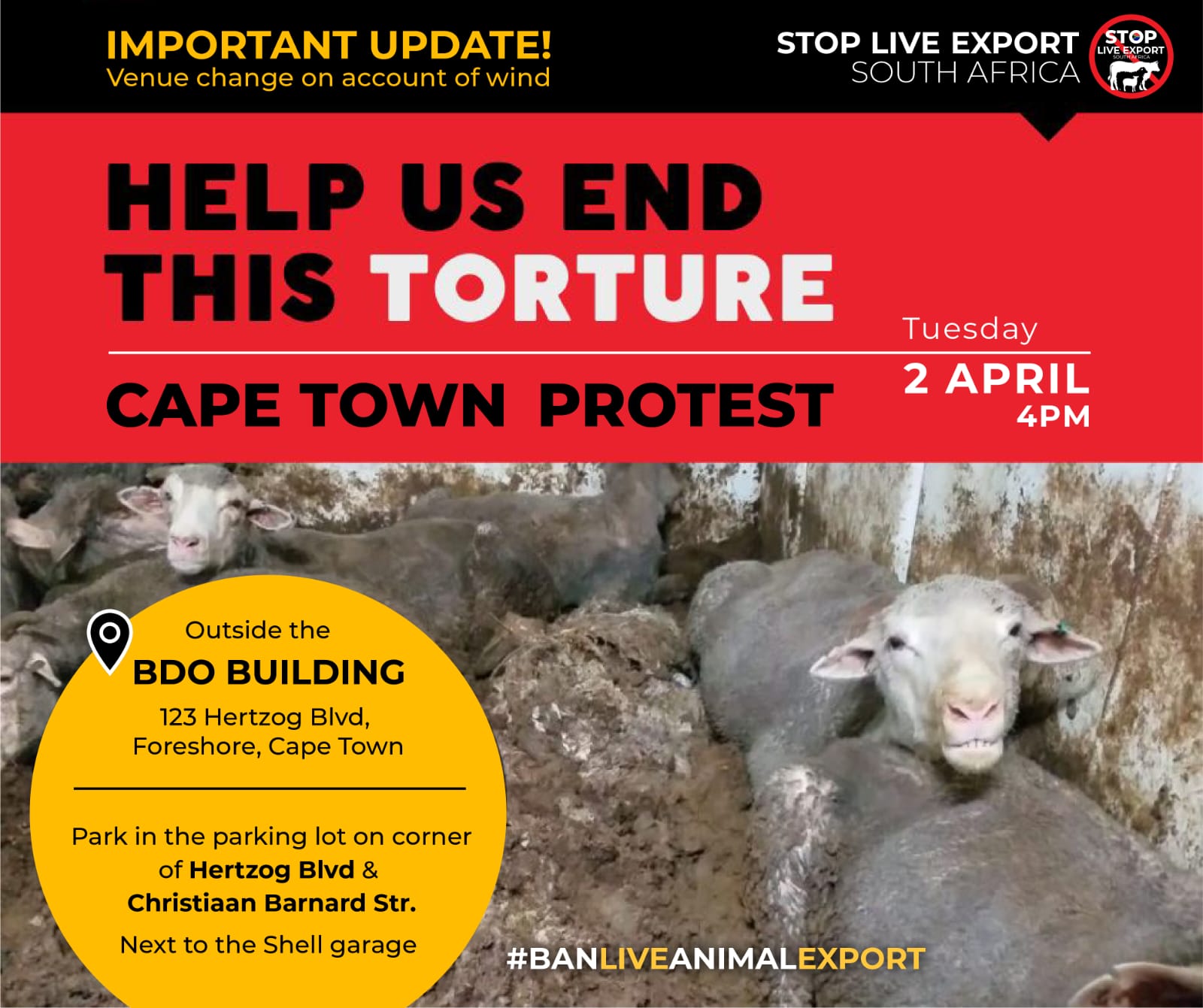



















 Become an Insider
Become an Insider
Protests will help nothing at all.
Arab oil money is the king of the world and the government is only too happy to roll over and have it’s disgraceful belly rubbed in exchange for shekels and a pat on the head.
Shekels, the wrong word, don’t you think?
There seems to be moves afoot globally and in Australia to stop this atrocious practice. Please support the SA equivalents who are trying to stop the cruel export of live animals. References to these organizations are in the article.
We are not so clever primates, essentially nepotistic by nature. We have culturally evolved to extend the altruism we have for family to clan, to village, to ethnic group, to nation, even to the whole of humanity. But largely thanks to anachronistic belief systems grounded in the myths of bronze age desert nomads, we seem incapable of extending it further to fellow earthlings, sentient beings capable of suffering horribly. The vain anthropocentrism of the Abrahamic faiths is perhaps the best evidence that they were contrived by man to serve man. In this case, Islam is the worst culprit with its absurd halal proscriptions.
It is deeply ironic that Halal practices supposedly align with the ethical treatment and slaughtering of these animals. But leading up to the slaughter, how they are treated doesn’t seem to matter. Apparently the animal must be alive, healthy and conscious at time of slaughter – is that true? Reads like double standards to me.
Hear Hear!
I am appalled and sickened to my core. How do people do these jobs day after day and not feel squeezy by what these animals are going through? Where is the relevant national department to intervene?
This disgusting and inhumane process must stop. Toss these disgusting humans responsible into the floating pens on the next voyage and have them disembark as vegetarians. Where can I contribute to an organisation which opposes this practice ?
Donald. You can donate to the National Council of SPCAs.
This is what happens when people take their ancient religion at face value. The obvious thing is to slaughter the meat on supply side and ship it frozen. That would be better for the animal, and more financially efficient – but the blindingly obvious is not applicable once it becomes a religious issue.